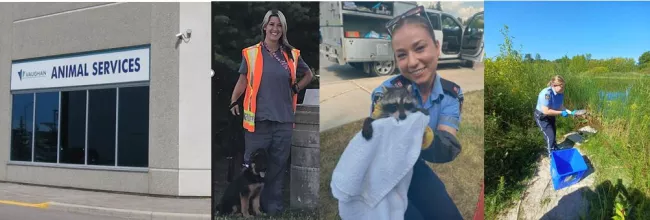Animal Services
Vaughan Animal Services is dedicated to creating a safe community for pets and their owners. Services include dog and cat licensing, animal control by-law education, pick up of injured or sick dogs, cats and wildlife (as well as stray dogs), reuniting owners with lost pets and pet adoption.
Shelter hours:
- Monday to Saturday: 8:30 a.m. to 4:30 p.m.
- Closed Sundays and statutory holidays
Adoption hours:
- Monday to Saturday: 10 a.m. to 4 p.m.
- Closed Sundays and statutory holidays
Wildlife education drop-in hours:
- Tuesdays: 10 a.m. to 11 a.m. and 3 p.m. to 4 p.m. at Dufferin Clark Community Centre (1441 Clark Ave. W.)
Microchip and Rabies Clinic
Check back soon for more information about our next clinic in June and more dates throughout the year.
Enforcement, adoption and other animal inquiries
Vaughan Animal Services encourages compliance with the Animal Control By-law. Complaints, adoption and other inquires can be made online, or by phone at 905-832-2281.
-
Answer
Feeling the effects of extreme temperatures? So are your pets. On days with extreme hot or cold, Vaughan Animal Services recommends keeping your pets – including dogs, cats and birds – indoors as much as possible. Not only is this the responsible thing to do, it’s the law!
As stated in the City’s Animal Control By-law, animals should be kept indoors during extreme temperatures, except for brief walks or brief periods of exercise. Any person violating the by-law may be fined up to $900. If you see an animal in a car or outside for a long period of time, you are encouraged to report it to Service Vaughan at 905-832-2281.
Follow these tips in extreme cold:- Never leave your pet outside for extended periods. That includes in a parked car, unattended on balconies or unsheltered in backyards in cold weather.
- Keep them warm when outdoors. Consider dog sweaters or coats as an extra layer of warmth for especially cold days.
- Wipe your pet’s paws after being outside. This can help avoid irritation with road salt. Or consider using booties to protect paws.
- Ensure they have a warm place to sleep. Keep them away from drafts and off the floor – a thick dog or cat bed with a blanket or pillow is great!
- Watch for signs of frostbite or hypothermia. This includes shivering, weakness, shallow breathing and redness, swelling and blisters on exposed skin.
Follow these tips in extreme hot:
- Never leave your pet in a parked car. In extreme heat, the inside of a car can reach 40 degrees within minutes which can be fatal.
- Make sure they have plenty of water. Keep pets hydrated during hot weather by ensuring they always have access to cool water.
- Watch out for sunburn. Short-haired pets and those with pink skin or white hair are more likely to get a sunburn. Reduce their risk by controlling your pet’s exposure to the sun – only let dogs outside for short periods of time.
- Keep them in a cool place. Use a fan or air conditioning to keep your home cool. Never leave your pet unattended on balconies or unsheltered backyards in hot weather.
- Watch for signs of heat stroke. This includes rapid panting, lots of drooling, hot skin or vomiting.
-
Answer
The public is asked to report any dead or ill geese to Vaughan Animal Services (VAS) at 905-832-2281 or animal.services@vaughan.ca and staff will respond. Please do not touch the birds.
As is always recommended by the Public Health Agency of Canada, members of the public should not handle sick or dead wild birds or other wildlife, as they may be infected with diseases that can spread to humans. Pets should also be kept away from sick or dead wildlife and be kept on leashes.
According to the Public Health Agency of Canada, wild birds in Canada and throughout the world are natural carriers of avian influenza viruses. Although some wild birds may get sick and die, others can be infected and still appear healthy. Avian influenza can spread to domestic poultry and can sometimes spread to mammals, such as foxes, skunks and mink, who may eat infected birds. Rarely, avian influenza may also spread to people. While the likelihood of becoming infected with avian influenza virus is low, individuals should still be cautious when handling infected wild birds or other wildlife because avian influenza has the potential to cause severe disease in people.
Vaughan Animal Services continues to discourage the use of birdfeeders and recommends removal of existing ones to limit the transmission of the virus. As well, cats should be kept indoors, and birdbaths should be removed.
If you have any questions about your property, please contact VAS at 905-832-2281 or animal.services@vaughan.ca.
Helpful links
Contact Information
By-law and Compliance, Licensing and Permit Services – Animal Services
Phone: 905-832-2281
Toll free: 1-855-227-7297 (PAWS)
Email: animal.services@vaughan.ca
Location:
Department
Vaughan City Hall, Level 100
2141 Major Mackenzie Dr.
Vaughan, ON L6A 1T1
Shelter
70 Tigi Crt., Unit 47
Vaughan, ON L4K 5E4
Additional Resources
- Brampton Animal Services
- Caledon Animal Services
- Georgina Animal Control and Adoption
- Mississauga Animal Services
- Ontario Ministry of Natural Resources and Forestry
- Ontario Society for the Prevention of Cruelty to Animals
- Toronto Animal Services
- Toronto Humane Society
- Provincial government ban of specific dog breeds

